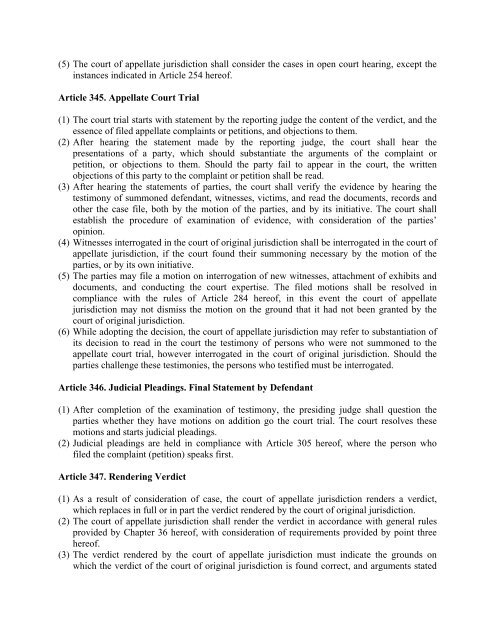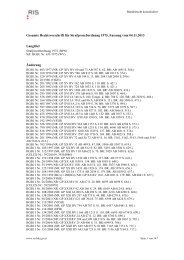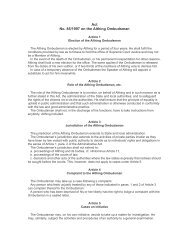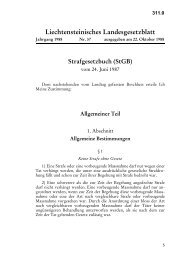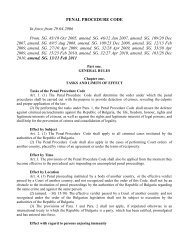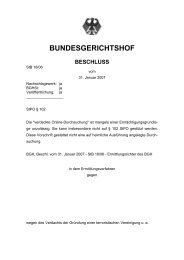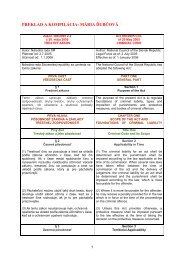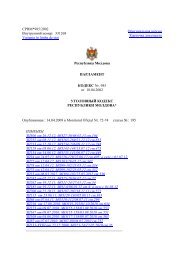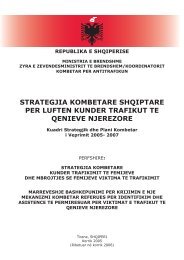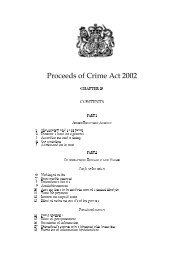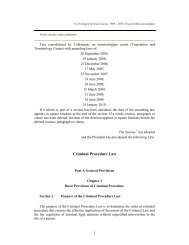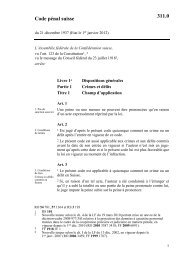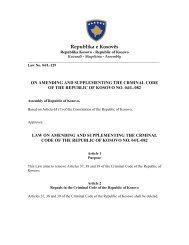Criminal Procedure Code of the Kyrgyz Republic - Legislationline
Criminal Procedure Code of the Kyrgyz Republic - Legislationline
Criminal Procedure Code of the Kyrgyz Republic - Legislationline
Create successful ePaper yourself
Turn your PDF publications into a flip-book with our unique Google optimized e-Paper software.
(5) The court <strong>of</strong> appellate jurisdiction shall consider <strong>the</strong> cases in open court hearing, except <strong>the</strong><br />
instances indicated in Article 254 here<strong>of</strong>.<br />
Article 345. Appellate Court Trial<br />
(1) The court trial starts with statement by <strong>the</strong> reporting judge <strong>the</strong> content <strong>of</strong> <strong>the</strong> verdict, and <strong>the</strong><br />
essence <strong>of</strong> filed appellate complaints or petitions, and objections to <strong>the</strong>m.<br />
(2) After hearing <strong>the</strong> statement made by <strong>the</strong> reporting judge, <strong>the</strong> court shall hear <strong>the</strong><br />
presentations <strong>of</strong> a party, which should substantiate <strong>the</strong> arguments <strong>of</strong> <strong>the</strong> complaint or<br />
petition, or objections to <strong>the</strong>m. Should <strong>the</strong> party fail to appear in <strong>the</strong> court, <strong>the</strong> written<br />
objections <strong>of</strong> this party to <strong>the</strong> complaint or petition shall be read.<br />
(3) After hearing <strong>the</strong> statements <strong>of</strong> parties, <strong>the</strong> court shall verify <strong>the</strong> evidence by hearing <strong>the</strong><br />
testimony <strong>of</strong> summoned defendant, witnesses, victims, and read <strong>the</strong> documents, records and<br />
o<strong>the</strong>r <strong>the</strong> case file, both by <strong>the</strong> motion <strong>of</strong> <strong>the</strong> parties, and by its initiative. The court shall<br />
establish <strong>the</strong> procedure <strong>of</strong> examination <strong>of</strong> evidence, with consideration <strong>of</strong> <strong>the</strong> parties’<br />
opinion.<br />
(4) Witnesses interrogated in <strong>the</strong> court <strong>of</strong> original jurisdiction shall be interrogated in <strong>the</strong> court <strong>of</strong><br />
appellate jurisdiction, if <strong>the</strong> court found <strong>the</strong>ir summoning necessary by <strong>the</strong> motion <strong>of</strong> <strong>the</strong><br />
parties, or by its own initiative.<br />
(5) The parties may file a motion on interrogation <strong>of</strong> new witnesses, attachment <strong>of</strong> exhibits and<br />
documents, and conducting <strong>the</strong> court expertise. The filed motions shall be resolved in<br />
compliance with <strong>the</strong> rules <strong>of</strong> Article 284 here<strong>of</strong>, in this event <strong>the</strong> court <strong>of</strong> appellate<br />
jurisdiction may not dismiss <strong>the</strong> motion on <strong>the</strong> ground that it had not been granted by <strong>the</strong><br />
court <strong>of</strong> original jurisdiction.<br />
(6) While adopting <strong>the</strong> decision, <strong>the</strong> court <strong>of</strong> appellate jurisdiction may refer to substantiation <strong>of</strong><br />
its decision to read in <strong>the</strong> court <strong>the</strong> testimony <strong>of</strong> persons who were not summoned to <strong>the</strong><br />
appellate court trial, however interrogated in <strong>the</strong> court <strong>of</strong> original jurisdiction. Should <strong>the</strong><br />
parties challenge <strong>the</strong>se testimonies, <strong>the</strong> persons who testified must be interrogated.<br />
Article 346. Judicial Pleadings. Final Statement by Defendant<br />
(1) After completion <strong>of</strong> <strong>the</strong> examination <strong>of</strong> testimony, <strong>the</strong> presiding judge shall question <strong>the</strong><br />
parties whe<strong>the</strong>r <strong>the</strong>y have motions on addition go <strong>the</strong> court trial. The court resolves <strong>the</strong>se<br />
motions and starts judicial pleadings.<br />
(2) Judicial pleadings are held in compliance with Article 305 here<strong>of</strong>, where <strong>the</strong> person who<br />
filed <strong>the</strong> complaint (petition) speaks first.<br />
Article 347. Rendering Verdict<br />
(1) As a result <strong>of</strong> consideration <strong>of</strong> case, <strong>the</strong> court <strong>of</strong> appellate jurisdiction renders a verdict,<br />
which replaces in full or in part <strong>the</strong> verdict rendered by <strong>the</strong> court <strong>of</strong> original jurisdiction.<br />
(2) The court <strong>of</strong> appellate jurisdiction shall render <strong>the</strong> verdict in accordance with general rules<br />
provided by Chapter 36 here<strong>of</strong>, with consideration <strong>of</strong> requirements provided by point three<br />
here<strong>of</strong>.<br />
(3) The verdict rendered by <strong>the</strong> court <strong>of</strong> appellate jurisdiction must indicate <strong>the</strong> grounds on<br />
which <strong>the</strong> verdict <strong>of</strong> <strong>the</strong> court <strong>of</strong> original jurisdiction is found correct, and arguments stated


